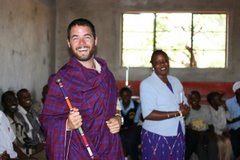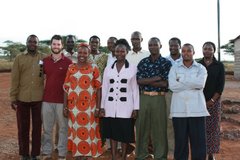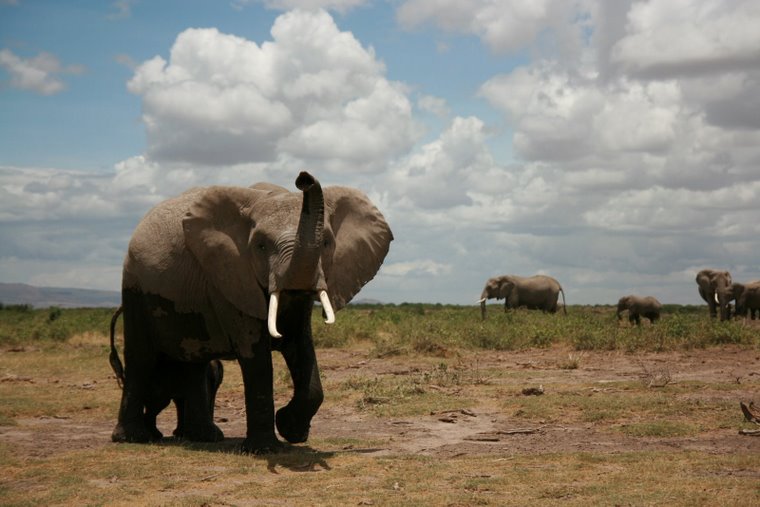Monday, April 2, 2007
Martin Luther King
The Form 1 English book includes two lessons on Martin Luther King's most famous "I have a Dream" speech. There is an edited version of the text, a tedious fill in the blank exercise that requires little more than rewriting the text, and a discussion exercise to be done in groups of four. I could not stop myself from giving the students simple context for the Civil Rights era in America at the start of the first lesson. I drew a crude chalk map of the U.S. and pointed out where Georgia and Mississippi are, explained the term segregation and talked about its roots, and gave a brief history of slavery and the American Civil War. I read the speech to them, they read it to themselves, and I asked the classic questions, "Has Martin Luther King's dream been realized?" and "Is there equality between races now?" The responses were thoughtful and we had an engaging conversation before we forced our minds back into the cookie cutter curriculum. "Yes, there must be equality because you are here teaching Mr. James," one student sweetly said.
When the book exercise asked the class to discuss their own dreams for Kenya in groups, I had to go one step further and make them write their own speeches as well. And I will treasure the texts that came out of this deviant creative writing project and the video I took of some of the students delivering their orations. I even have hand written copies of twenty five speeches to bring home with me.
"I have a dream that one day girl's education would be looked at with great interest. Our young girls who are tomorrow's future are being married with older men. I do hope that some years to come this terrible ordeal will come to an end." - Rahab Wanjiru
"I have a dream that all Kenyans will live in harmony in houses such as bungalows, detached house and semi detached house. Its my dream that all the forty three tribes will come together and call each other brother and sisters and practice socialism as our neighbor Tanzanians do."- Josephat Kariuki
"I have a dream that some day coming Kenya's education will be free from secondary up to university. So people will be learned and some years coming all citizens will have knowledge and there will be no such things as female circumcision." - Lucy Gathere
"I have a dream that one day in our country Kenya corruption will come to an end and all people in high level will love people in low level and see them just like brothers and sisters and treat them fairly." -Miriam Ndinda
Shakespeare
Portia voices her discomfort, "O me, the word 'choose!' I may neither choose whom I would nor refuse whom I dislike; so is the will of a living daughter curbed by the will of a dead father. Is it not hard that I cannot choose one nor refuse none?" And it occured to me, in the midst of prepping a lesson, how like Portia my young female students were. It is the common practice of both Maaisai and Kikuyu families to marry their daughters off at exceptionally young ages to older men, without giving the girl any voice in the selection or the timing. Often these girls are taken from school, kidnapped either figuratively or literally, and married at twelve and thirteen years of age to men twice their age. It rarely seems to occur to the men in the society that this tradition is stealing the best years of a child's educational life or that girls deserve a right to "choose whom they would or refuse whom they dislike." Even one of the teachers at Oloile, a funny and energetic man named Mr. Mirie, admitted to me that his wife of seven years is now 19 years old, a secondary school aged student herself with a child in primary school. And it is hard not to mention the lack of choice these same girls have in the ceremonial mutilation of their genitals as they come of age, in what has been dubiously named female circumcision, a sicekening practice still followed by most. So it was into this paradigm that I threw out a question to my class. "Do you think it is fair that Portia does not get to make a choice about who she will marry?" I tried with all my might not to steer the conversation toward my own cultural bias, but I did push the girls in particular to partake in the discussion. They said things like, "It's fair because her father knows what is best" or "It's not fair because she may not love the man she marries." It is, of course, hard to say from the simple opinions shared what conclusions we came to that day in class, but I pray the seeds planted will fuel more questions.
And I wonder if Big Bill ever knew his sex jokes would cause such a stir in this tiny place so far from Venice. Portia pokes fun at one of her suitors, the Neopolitan prince, for boasting about the size of his parts. "Ay, that's a colt indeed, for he doth nothing but talk of his horse; and he makes it a great appropriation to his own good parts, that he can shoe him himself. I am much afeard my lady his mother played false with a smith." Let me just say, the rolls of laughter were a great treat in the class when the students finally understood the dirty point of the pun.
There is one character in the play that I have never thought much of: The Prince of Morocco. He is pompous and his scenes are a bit wordy, maybe even boring to some. But when the only African character in the story entered the stage for the first time, and said his famous "Mislike me not for my complexion, the shadow’d livery of the burnish’d sun", my students sat up in a way that made me look at the Prince again. "Based on Shakespeare's characterization of the Prince of Morocco, what is being depicted about Africans?", I asked. And the answers poured in, observations like "Africans are scary to fight", "Africans brag a lot", and "Africans are not equal". Who knew how much relevance five hundred year old Elizabethan poetry and prose had to contemporary life in the African bush?
Wednesday, March 21, 2007
Sounds
The trees on that hill are alive with noise. Tiny colorful creatures tooting, tweating, twerping. Call the sounds what you will, but Bird calls do not make for good words. You can try: "chew chew...chew chew", "weet, weet, weet", "pwoy pwoy...pwoy pwoy", "beeng beengbeeng", "kook kook...kooook", or "wawawawawa". However, birds do not whistle in vowels and consonants; rather they sing in natural melodies and surprising harmonies, and the lyrics are less important than the notes themselves. And, of course, the music of calls can not be recorded in prose anymore than the taste of wine can be represented in mathematics. Some calls are exotic, like noises from a Star Wars movie or sounds from a computer gone crazy. Others are familiar like the"caw caw" of crows and the "cock a doodle doo" of the rooster. (The cock on the farm here unfortunately has a hard time reading his watch though. The crazy thing sounds at 1 am most nights.) These birds of the bush make a constant chorus, and the beauty of it is hard to miss.
Other noises accompany the days as well. Flies, wasps, bees, and mosquitoes whiz in annoying tones. The buzz of their wings is as aggravating to the ear as the flapping of a bird wing in flight is pleasant.Sometimes I sit to read or write and am driven to flinch so often I feel epileptic. I had hoped that somehow I would grow accustomed, or at least less sensitive, to the bug noises and the tickles of their legs on my skin, and I guess I have a bit, but even today I went on a wasp killing spree using my notebook as a weapon to wipe out five in one sitting.
Then there are the farm sounds. Cows make that bellowing belly noise we call "moo". And goats make my ears laugh. One young female sounds so much like a woman crying and moaning I have mistaken it twice. The older male is aggressively horny, shaking his head, wagging his tongue grotesquely, and begging to mate. It seems like some joke of nature.There are the tin sounds of constantly dinging bells, the ones worn around the necks of animals as they go out to pasture. The farm also is home to a pack of scroungy mutts who constantly howl and fight for food, or maybe just for fun. They often slam each other against the walls and doors of the house so violently there is nothing to do but laugh in disbelief. I sometimes suspect the dirty dogs are mauling one another to death and the wood is so thin it seems like they are in the room with me.
Friday, March 9, 2007
Village Life
 The school feels like a baby, who is hard to leave with a sitter, not so much because I don't trust the principal and faculty when I am away, but because I have begun to love the thing and feel responsible for its well being. It is young, easily influenced and easily taken advantage of. The new programs I have pushed are just starting to take toddler steps, so I am afraid they will falter in my absence. Maybe I am just trying to hard to control the place and for that reason my short trips out of town are a good prep for my leaving in a month. After all I couldn't leave for five days without writing a list of 15 to do's for the faculty to complete during the week. And I have fretted like a mother wondering: Is the new fence complete? Are the students who performed poorly on their midterms being attended to? Is registration proceeding? I will have to relinquish those day to day concerns soon enough. The school will need to fly on its own. But I am afraid that I will leave before the chick has full fledged wings.
The school feels like a baby, who is hard to leave with a sitter, not so much because I don't trust the principal and faculty when I am away, but because I have begun to love the thing and feel responsible for its well being. It is young, easily influenced and easily taken advantage of. The new programs I have pushed are just starting to take toddler steps, so I am afraid they will falter in my absence. Maybe I am just trying to hard to control the place and for that reason my short trips out of town are a good prep for my leaving in a month. After all I couldn't leave for five days without writing a list of 15 to do's for the faculty to complete during the week. And I have fretted like a mother wondering: Is the new fence complete? Are the students who performed poorly on their midterms being attended to? Is registration proceeding? I will have to relinquish those day to day concerns soon enough. The school will need to fly on its own. But I am afraid that I will leave before the chick has full fledged wings.I guess, my fear is that left to its own devices, the community will be satisfied with "good enough". And I have such high hopes, expectations really, that this small secondary school will be something special, set apart as unique in the country, an institute of excellence. I have practical ideas for specifically how it can become what I dream it could be. But seeing those hopes through requires a commitment beyond what I have promised, an agreement to stay past ten weeks and maybe even past ten years.
I suspect that even if I return in say six months the place will not have continued all that I have started. Or perhaps I am egotistically over estimating my own influence, and the school will roll along without worry. Something I will pray for. But in the meantime, in this next month while I am here, I don't want to miss anything, any chance to help navigate the course, any meeting where decisions are made, any class where students are captivated by curiosity for a new idea. I know that in the end my leaving will be too soon. I know I will be distracted in the time I have left. I know that all that can be accomplished, will not be accomplished. I know I will go back to New York feeling I have abandoned the child in its infancy.

These trips out of the village have reminded me too that I will soon be returning to a more modernized world, where conveniences are normal again. Surprisingly though, when I am away from Kimana, I miss village life. Yes it is tedious, predictable, provincial even, but the simplicity of it has captured me in a way I had not expected. It is not nights out on town that I am longing for, but early evenings with Tyson, Miriam, Eunice, Siente, Nasieku, and baby Rachel, the
 family, sitting around lanterns and eating ordinary food and laughing over the most everyday stories. It is this little home and the life inside its walls that is Kenya to me, and stepping away to visit cities like Nairobi and Kampala reminds me that I will soon have to give up the day to day coming and going, sleeping and waking, eating and laughing that I have grown attached to. I will miss these simple things dearly.
family, sitting around lanterns and eating ordinary food and laughing over the most everyday stories. It is this little home and the life inside its walls that is Kenya to me, and stepping away to visit cities like Nairobi and Kampala reminds me that I will soon have to give up the day to day coming and going, sleeping and waking, eating and laughing that I have grown attached to. I will miss these simple things dearly.Friday, February 9, 2007
Prayer in School 2/9/07
 Two days after the Americans came, a tall, hazlenut skinned student named James came to see me trailed by his shorter, darker classmate Mutio. They came to the faculty building with their exercise books in hand, in order to hide their real need: counsel. We strolled some twenty five yards to the nearest tree, where in the shade James explained that he and his friend suffered under the same burden. The taller boy went on to tell me a tough story. His mother is Kenyan, his father Scottish, an immediate explanation for his exotically lighter features and perfect English I thought. But the tale was far from romantic. James was born out of wedlock and this foreign father ran from the African affair to return to his richer roots when James was only a toddler. Through hard work, James' mother had supported her son, until in 1998, the eight year old boy came down with a case of Cerebral
Two days after the Americans came, a tall, hazlenut skinned student named James came to see me trailed by his shorter, darker classmate Mutio. They came to the faculty building with their exercise books in hand, in order to hide their real need: counsel. We strolled some twenty five yards to the nearest tree, where in the shade James explained that he and his friend suffered under the same burden. The taller boy went on to tell me a tough story. His mother is Kenyan, his father Scottish, an immediate explanation for his exotically lighter features and perfect English I thought. But the tale was far from romantic. James was born out of wedlock and this foreign father ran from the African affair to return to his richer roots when James was only a toddler. Through hard work, James' mother had supported her son, until in 1998, the eight year old boy came down with a case of Cerebral  Malaria, the most deadly form of Africa's greatest killer. It brought the boy so close to death, literally, that to hear him tell it, he was taken to the mortuary before the doctor noticed the supposed corpse was urinating, and so still living. In her desperation, James' mother reached out to her son's far away father. Apparently after hearing that his bastard son was on his death bed, the old man simply hung up the phone. Two years later, James came to the simple and wrenching conclusion that his father "didn't want him".
Malaria, the most deadly form of Africa's greatest killer. It brought the boy so close to death, literally, that to hear him tell it, he was taken to the mortuary before the doctor noticed the supposed corpse was urinating, and so still living. In her desperation, James' mother reached out to her son's far away father. Apparently after hearing that his bastard son was on his death bed, the old man simply hung up the phone. Two years later, James came to the simple and wrenching conclusion that his father "didn't want him".As the other students at Oloile wandered around with their lunch plates in hand, Mutio quietly told a story similar to James’. His father had left his mother, a rare and stigmatizing event in Kenya, and remarried, leaving his family with little money and little means to make more. Two years ago, the man died and the new wife laid claim to every little thing left behind. When a year ago Mutio came down with a severe illness and needed support, he, like James, had to survive without it. The two boys had moist, glazed eyes as they related their life histories. They each had a slight pleading tone in what they revealed to me, a hope maybe for financial help or school sponsorship, but the truth of their tales was evident in their faces. They looked hard at me with expectation. I was in water over my head. Their circumstances seemed so wholly other than mine. There was no sunny side. And with my back up against this hopelessness, I tried to offer the comfort I had to give.
"The first thing I want you both to know," I said slowly, gently to make sure I was understood, "is that you are worthy and deserving of love...far more than your fathers have shown you. I am sad because you have lived hard lives, beyond what I can even understand. I hope here at school you know you are cared for... that you have friends and teachers who are here to hear you if you want to talk. And I hope you find men here who will guide you in some of the ways your fathers have failed to." What I was saying did little to assuage the boys, and I knew it, so I retreated to the language of faith. It was all I had and I was greatly relieved to have it. "What I want you to know most though, is that you are not fatherless. You have a greater father in heaven. And though you may feel like your dad doesn't want you or he has abandoned you, God wants to love and care for you. He has not abandoned you."
Even now putting those words down, they seem trite. But in the face of senseless hurt, I was left with no other answer to give these boys. The alternative is to say that the world is cruel beyond belief to some and that life may in the end be utterly meaningless, so it was only my belief in things unseen that I had to offer. And though most days I barely have faith enough to show up to a Sunday service, when I listened to the burdens these boys were bearing, I wanted to believe in a God who must be there for orphans and widows. The alternative is hopelessness.
So before we parted I prayed for my two students in specific words with my hands on their shoulders. I prayed a simple prayer that they would know they are loved and that the school would be a place where they are listened to. I thanked this unseen Father for Mutio and James, for their honesty and courage. And before I said, "amen", I could feel the boys shaking with tears. I opened my eyes to find two seventeen year old teenagers crying like little boys. I still felt ill equipped to care for them. Afterall, I had come to Kenya to teach and to build a school and what these children needed most was counseling, someone to listen to them and love them. The force of that need was to fierce to face alone, and I was thankful to have a greater father who was somehow, mysteriously in our midst.
Inequality 2/18/07

It is a place where roads are often impassable because of rain, and dangerous because of disrepair. A place where four months ago a bus full of 26 women heading to a church conference met head on with a truck that took the lives of 14 people, leaving 5 area pastors instant widowers. A place where breaking down is so common it goes without mention. Where gas and kerosene are carried carelessly in plastic zip lock bags, and two years ago six people died in house fires when on one day the fluid meant for cars was accidentally sold for lanterns.
Kimana is a place where latrines are stinking holes in the ground covered in excrement and buzzing with flies and toilet paper is rarely found. Where hands of welcome are offered everywhere and are universally covered in God knows what, but must be shaken nonetheless, and those same hands prepare food tainted just enough some days to make you puke til you pass out. A place where drunkards wreaking of moonshine plaster your face with their breath as they babble. Where water can contain sickening elements and rivers are hop scotched by women with babies strapped to their backs and jugs in their arms.
A place where officials are ubiquitously bribed and favors are rarely done without expectations. It is a place where you sometimes feel inexplicably defensive and irritable. Where sob stories are contrived for listening white ears. Where everyone who approaches you seems to do so with a hidden hope: a child they want you to sponsor, a trip they want you to pay for, an item they want to overcharge you for. A place where cynicism is a daily sensation. Where it is only honest to admit to at some moments thinking the place is a shit hole. Or worse even: God forsaken. A place that forces the precarious conclusion that all men may be created equal, but all countries are not, all societies are not, and all communities are not.
Thursday, February 8, 2007
Pole Pole 2/11/07
Pole pole is Kiswahili for "slowly by slowly", and I have often heard the phrase from my Kenyan friends as advice to me. It also describes well my learning curve here.
Each day I am growing, which, I suppose, is a typical observation from anyone in a foreign environment. Some days I grow a bit through small successes, and other days when I make adolescent mistakes the spurts are more severe. But little by little, day by day, I am learning how to move beyond the idealism of trying to affect the world, through the disillusionment that comes from smacking my nose repeatedly into the wall of disappointment, and into this quest to make a realistic impact on a community scale.
Ten days ago I devised a contract for the staff of Oloile Secondary to sign. Rushing back down the hills from Loitokitok to the school with the forms in hand, I failed to predict the obvious: the teachers would be apprehensive about signing an agreement because they are not used to such things. It was raining past the point of down pour when I arrived, and the sound of the water against the tin roof was deafening. The late afternoon sky had prematurely darkened, and I should have taken the sign that the timing was wrong. Anything I rush here backfires. Though the contract is written firmly in favor of the worker and was meant to give the faculty confidence in their job security, it was not until I made amends by holding a meeting the next afternoon just to explain the terms that I was able to abate the skepticism they felt. I can't blame them, given the corruption most here are accustomed to. Thankfully, after recognizing my mistakes, and slowing to a Kenyan pace, the entire teaching staff signed on for at least two years. Some even have guaranteed five. Most importantly, Eve, the head teacher, has committed herself to three, a decision I awaited all weekend and am delighted to have received. So through my mistakes, I am learning, pole pole, to slow down and to listen.
There are moments though that I am lucky, days filled with good work and fulfillment, hours when I imagine that I have accomplished something, nights when I go to sleep excited with the seeds I am seeing sprout. I hope that with greater experience, knowledge and insight those moments will become more frequent, but for now I cherish them when they arrive.
The teachers and I met on Monday night for our first Teaching Seminar, and I am excited about what will happen in the ten weeks to come. We are discussing practical ways of engaging the whole class. Our four rooms are stuffed with fifty students each and each lesson is manned by one teacher. I wish we could make for smaller class sizes, but the fact is we are now turning students away daily. By putting my first two week's time into observing each teacher in lessons and taking careful notes on ways we might improve the atmosphere in these overcrowded classes, I earned some trust from the faculty as someone who would listen before acting. And though I am proposing some ideas that seem outlandish to them- suggestions like team teaching and peer observations, I believe that slowly by slowly, the teachers will come along. I am learning to take the time to get faculty leaders on my side and to get others to also own my ideas, because when I have tried to take the lead by myself, I have eaten a full plate of dry resistance. But mostly I am learning to believe that good ideas can be implemented and made to work, when conditions are right. The programs I am devising will have life, as long as I don't fall prey to needing the approval of everyone, which I am prone to, and, at the same time, avoid monopolizing the arena of ideas by speaking too much. For now I am starting small, practically.
This week I encouraged the teachers to learn the students’ names by making seating charts for them to fill in, giving the students name tags, and offering a financial reward to any teacher who knows the names of 90% of the student body by month's end. Those suggestions sound so simple, but here they are new. We discussed ways to invite more participation in class- calling on students randomly, walking the aisles to involve the back rows, and welcoming wrong answers, so hesitant students do not fear ridicule. Next week I will set up partnerships between those who teach similar subjects and ask each partner to observe the other during one class a week in order to take notes on how the ideas we are discussing are affecting teaching methods. I am hoping that if this peer to peer evaluation works and real conversations happen between colleagues, then programs will take hold and a system of accountability, that does not depend on my input, will be in place.
Slowly by slowly, I push through the wishful thinking of world scale reform, past the cynicism of corruption and broken systems, and into the work of practical grass roots programs. These small moments of satisfaction are like sips from the cup of hope. Pole pole, I believe that the community will be transformed.







